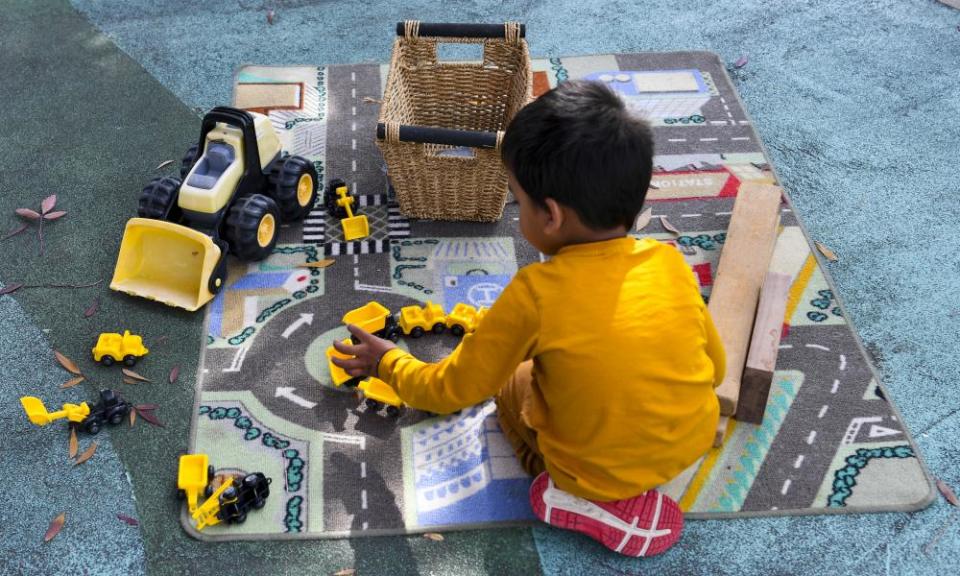Federal budget flags $1.6bn education boost for preschools but sets conditions for states

The Morrison government will pour $1.6bn into preschool services over the next four years but will set conditions for the states and territories, including attendance targets that are to be decided.
The federal government plans to negotiate a new funding agreement to “support continued universal access to at least 15 hours of preschool each week (600 hours per year) for children in the year before they start school”, meaning four-year-olds.
The budget announcement appears to fall short of a push by reform advocates for a focus beyond improving preschool enrolments among four-year-olds, but also among three-year-olds, where Australia lags the OECD average.
The federal government says the new funding will be conditional on the states and territories agreeing to a “robust reform timeline” focused on increasing participation and school readiness.
From 2024, payments to the states and territories will be explicitly tied to attendance targets.
Although the treasurer, Josh Frydenberg, told parliament the government would “commit $2bn to fund preschools”, the budget papers show the actual funding is $1.6bn over the current four-year budget cycle.
The discrepancy is related to the difference between budget years and the new funding agreement. The new national agreement – to be negotiated with the states and territories – is expected to cover the 2022 to 2025 preschool years.
The federal government’s preschool commitment will end up being worth $589m a year on an ongoing basis.
The funding conditions will include a requirement that, from 2023, every child enrolled in an approved preschool program “will see the full benefit of commonwealth funding (around $1,340 per child in 2022) regardless of the preschool setting”, according to the budget papers.
The federal government says it will earmark nearly $34m over the next five years to find ways to improve preschool-related data collection.
One of the goals, it says, is to be able to test “the degree to which preschools achieve the outcome of getting children school-ready”.
This is expected to lead to the development of a system of measuring preschool outcomes from 2025 onwards.
Related: Asio to get $1.3bn over 10 years as federal budget puts $1.9bn price tag on national security
The move follows longstanding calls for reform, with advocates describing the beneficial impact of quality early childhood education and care (ECEC) as “compelling and irrefutable”.
The Parenthood, an advocacy group, outlined problems with the current system in its pre-budget submission.
“Despite success in lifting enrolments of children in preschool programs in the year before school (four-year-olds) Australia is in the bottom third of countries ranked by the OECD in relation to enrolment of three-year-olds,” the group wrote.
Last month a group of prominent Australians, including business and union leaders, called on the government to invest in and reform the system and to “work to the goal of universal access to quality early childhood education and care”.
There has also been growing global momentum for reforms, including in the US, where Joe Biden last month announced a plan to provide universal, high-quality preschool to all three- and four-year-olds.
Frydenberg said on Tuesday night the government would spend an extra $1.7bn on childcare, in a measure the government had already announced at the beginning of May.
“This will increase the affordability of childcare for low- and middle-income families,” he said.
Frydenbeg said 250,000 families would “be better off by an average of $2,200 each year” and it would give more parents, especially women, the choice to take on extra work.
“Preschool is a vital time in a child’s development and prepares them for the educational journey ahead,” Frydenberg said in his budget speech on Tuesday evening.
“Participation of four-year olds in ECEC in Australia is significantly lower than in the United Kingdom, New Zealand and Norway.”
The statement was backed by the chief of the Business Council, Jennifer Westacott; the president of the Australian Council of Trade Unions, Michele O’Neil, the president of Chief Executive Women, Sam Mostyn, the deputy chair of Goodstart Early Learning, Natalie Walker, and the executive director of The Parenthood, Georgie Dent.
The Labor leader, Anthony Albanese, had promised childcare reforms in his budget reply speech last October, paving the way for a focus on the issue in the lead up to the election, due later this year or early 2022.

 Yahoo Finance
Yahoo Finance